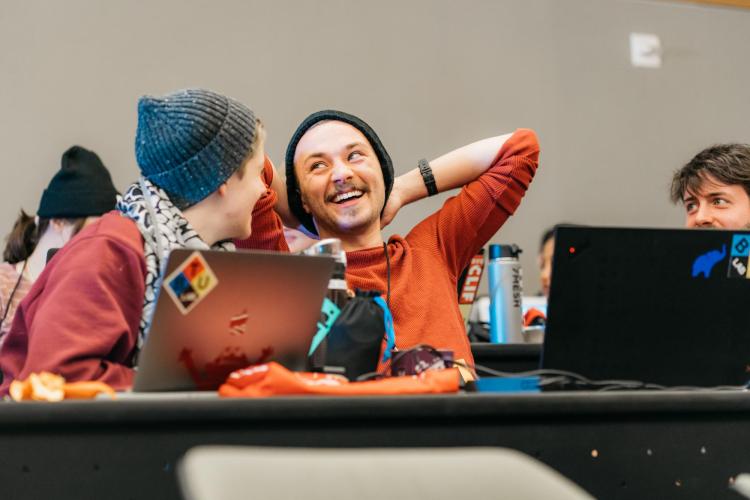Class of 2020: Alex Fiel

Fiel graduates magna cum laude with a BS from the College of Engineering and Applied Science in Technology, Arts and Media and is a recipient of the ATLAS Institute's Outstanding Undergraduate Award. In addition to being a successful student, Fiel has proved himself a leader, receiving the 2016 campus-wide hall council president-of-the-year award for his term as president of the Williams Village North dormitory. Their biggest achievement? Organizing a “dorm olympics” and a haunted house. “We went big!” recalls Fiel.
Academically his breadth of study was wide. Freshman year, Fiel completed an independent study with Professor Mike Eisenberg, and as a sophomore he took a semester off from CU Boulder and studied social entrepreneurship at the Watson Institute, based in Chautauqua in Boulder.
“Alex is a perpetual tinkerer, his work is technically robust, mechanically interesting, and fun,” said Matt Bethancourt, TAM director and senior instructor. “His projects and abilities are wonderful examples of what I would hope to come out of the TAM program for creative technologies and design.”
Exceptional Projects
Fiel’s projects have attracted the attention of the national hacking/making community. After a recent collaboration with TAM student Anna Lynton called “Time Measure (Tape Measure Clock)” was posted on the website Instructables, it was picked up by another popular hobbyist website, Hackaday, which helped bring more than 48,000 views to his original post. The project, which was completed for ATLAS Instructor Arielle Hein’s “Time” class, involved making a clock out of a tape measure that displays the local time in inches. The two also won second place in the Instructables Clock Contest.
Of all the projects he’s completed, Fiel is most proud of the Solar Arcade that he and his teammates prototyped for Designing a Science Exhibit class, taught by ATLAS Director Mark Gross. CU Boulder’s Fiske Planetarium later employed Fiel and several teammates to turn the project into a permanent solar magnetism exhibit.
Constructed from high density polyethylene to support patrons walking on it and using Adafruit Fadecandy to instruct LED strips how to function, each panel has a garage-door-style sensor that instructs a Raspberry Pi to spawn sunspots when the beam is broken.
“We had a real problem to solve,” Fiel said. “We had to meet with the clients, understand what they wanted, counter and say what we could do. The project played to our strengths, and we ended up creating something that will be at Fiske for a long time. It felt like it was the kind of work I’ll do in real life.”
Outside of campus, Fiel has been involved with Rotary Youth Leadership Awards as a camp counselor and mentor for highschool students. He spends his free time experimenting with new materials and learning new tools, including tackling Blender, a free and open source 3D creation suite, and photogrammetry to create this spring’s ATLAS virtual graduation reception, which he is building on Mozilla Hubs.
Fiel says he’s designing the reception so anyone can easily participate. Users will be able to create avatars and decorate their graduation hats and socialize in the virtual representation of where ATLAS graduations are normally held, the Visual Arts Center courtyard. Voices will increase and decrease in volume depending on how close or far an avatar is from another avatar. And there will be virtual rooms where students can host private virtual graduation parties with family and friends from across the country.
“The key thing TAM taught me is: you can make it functional, you can make it pretty, but can you make it fun?” Fiel said. “I want to get moms, dads, siblings in the same place, having fun, walking around and seeing each other. It’s definitely secondary to an in-person graduation, but my goal is to see how close can we get?”
Fiel plans to continue working over the summer on his capstone project, fishcity.co, an online education platform centered around connecting existing educational resources into a navigable “city” visualization. Resources are structured as a city, with similar subjects forming “neighborhoods.” When finished, users will be able to navigate the paths through the city or browse, documenting their learning with projects along the way.
Beginnings
Fiel grew up in Greeley, Colorado, where as a child he dreamed about becoming a Lego master model builder. While still in high school, he completed 38 college credits with a 4.0 GPA and was his class salutatorian. After flipping between computer science and mechanical engineering as majors, he arrived on campus intending to study mechanical engineering, but switched gears on Admitted Students Day when he heard Assistant Professor Joel Swanson present the TAM major.
“I learned college could be like all the summer camps I had been to–exploring 3D printing, doing shop, working with electronics and microcontrollers,” Fiel said. “Choosing any other engineering major would have felt like missing out on learning in other areas.”
He had planned to travel to Vietnam, Kenya and Tanzania with a friend after graduation, but COVID-19 has put those plans on hold. He’s now focused on finding work as a creative designer.
“TAM has given me confidence that I can enter new fields and or try new things,” Fiel said. “It breaks the barrier of ‘Oh, I could never do that.’ When you want to take it further, you can figure it out.”
His advice for the incoming class of 2024?
“Look into the resources available on campus and try new things. If you’re interested in something, college is the time to explore it.
“Graduating isn’t a finish line. It’s the end of your formal learning, but it’s the beginning of the ‘rest-of-your-life’ learning.”


